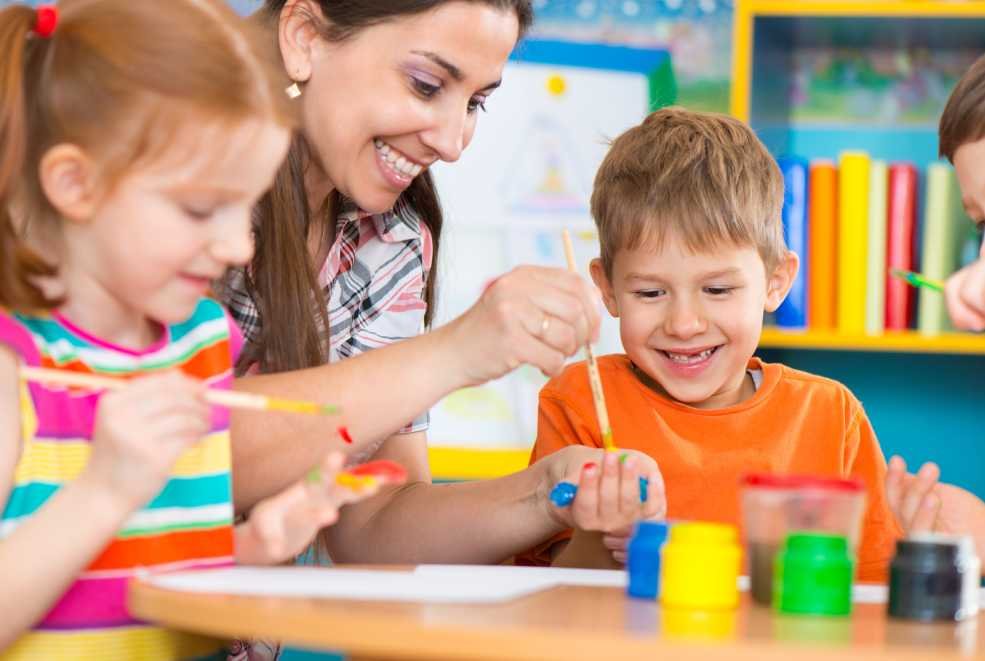![Is Your Child Ready for Preschool? Smyrna Day School’s Guide to Making the Decision Introduction to Smyrna Day School Preschool education is not merely a stage in a child’s life; it’s a pivotal stepping stone that shapes their future academic and social trajectory. As […]](https://dayschools.org/smyrna/wp-content/uploads/sites/4/2023/07/Smyrna-Day-School-9.jpg)
Table of Contents
Introduction to Smyrna Day School
Preschool education is not merely a stage in a child’s life; it’s a pivotal stepping stone that shapes their future academic and social trajectory. As parents, we are entrusted with the responsibility of making decisions that profoundly impact our children’s growth and development. Among these decisions, determining whether our child is ready for preschool stands as a significant milestone, one that can evoke a sense of uncertainty and apprehension.
At Smyrna Day School, we recognize the weight of this decision and the importance of providing parents with guidance and support throughout the process. With a deep understanding of early childhood development and years of experience in nurturing young learners, Smyrna Day School offers more than just a preschool experience; it provides a foundation for lifelong learning and success.
Our approach goes beyond academics; we prioritize holistic development, fostering not only cognitive skills but also social, emotional, and physical well-being. We understand that every child is unique, with their own strengths, challenges, and readiness indicators. That’s why we’ve crafted a comprehensive guide to help parents navigate this decision-making journey with confidence and clarity.
Through our guide, parents will gain insights into assessing their child’s readiness across various domains, from physical milestones to social interactions, cognitive abilities, and emotional resilience. By understanding the nuanced cues of readiness and equipping themselves with practical tools and strategies, parents can make informed decisions that set their child on a path to success in preschool and beyond.
Smyrna Day School stands as a beacon of support and guidance for parents embarking on this journey. With our expertise, dedication, and unwavering commitment to each child’s growth and development, we ensure that every child receives the foundation they need to thrive in preschool and beyond. Join us as we embark on this journey together, laying the groundwork for a lifetime of learning, exploration, and achievement.
Physical Readiness at Smyrna Day School
Fine Motor Skills
Fine motor skills are the intricate movements and coordination required for tasks involving small muscles, such as those in the hands and fingers. These skills play a crucial role in everyday activities like writing, drawing, and tying shoelaces. In the preschool setting at Smyrna Day School, fine motor skills are honed through a myriad of engaging activities, ranging from painting and sculpting to threading beads and cutting with scissors.
As children manipulate art supplies, play with building blocks, or engage in puzzles, they refine their hand-eye coordination and dexterity, laying the foundation for future academic tasks. Parents can observe their child’s ability to grasp objects with precision, manipulate tools with control, and perform tasks that demand intricate hand movements.
For instance at Smyrna Day School, handing your child a crayon and observing how they grip it, whether they use their fingers or fist, and their ability to make intentional marks on paper can offer valuable insights into their fine motor development. Similarly, activities like buttoning a shirt, zipping a jacket, or using utensils during mealtime provide opportunities to assess their manual dexterity and coordination.
Gross Motor Skills
In contrast to fine motor skills, gross motor skills involve larger muscle groups and movements that require coordination and balance. These skills are fundamental for activities like walking, running, jumping, and climbing, which are integral parts of a child’s daily life and play. At Smyrna Day School environment, outdoor play areas serve as dynamic settings for children to engage in activities that promote gross motor development.
From navigating obstacle courses to playing tag and kicking balls, preschoolers engage in a variety of physical activities that challenge their coordination, strength, and spatial awareness. Parents can observe their child’s proficiency in activities like hopping on one foot, skipping, throwing and catching a ball, or climbing playground structures.
By assessing their child’s ability to maintain balance, coordinate movements, and navigate different terrains, parents can gauge their readiness for the physical demands of preschool. Additionally, observing their enthusiasm for physical play, willingness to explore new movements, and perseverance in mastering challenges can provide further insight into their gross motor development.
Overall, a balance of fine and gross motor skills is essential for a child’s overall physical readiness for preschool. By observing and encouraging their progress in these areas, parents can support their child’s development and ensure they are prepared to engage fully in the diverse activities offered in the preschool environment.
Social Readiness at Smyrna Day School
Interaction with Peers
Smyrna Day School is more than just a place of learning; it’s a vibrant social ecosystem where children navigate the complexities of interpersonal relationships. At this crucial stage, they begin to develop essential social skills that form the foundation for future interactions and friendships. One of the primary aspects of social readiness is the ability to engage with peers effectively.
Observing your child’s interactions with others can provide valuable insights into their social readiness. Pay attention to their comfort level in group settings and their willingness to initiate or respond to social cues. Look for signs of empathy, such as comforting a friend who is upset, sharing toys or snacks without hesitation, and taking turns during playtime.
Furthermore, at Smyrna Day School we observe how your child communicates with their peers. Are they able to express their thoughts and feelings clearly? Do they actively listen to others and respond appropriately? These behaviors reflect their ability to engage in reciprocal interactions and contribute to cooperative play—a cornerstone of social development in preschool.
Additionally,at Smyrna Day School watch for signs of interest in forming friendships. Does your child seek out opportunities to play with others? Do they show excitement when talking about their peers or eagerly anticipate social events? Genuine interest in connecting with peers and forming bonds indicates a readiness to thrive in the social environment of preschool.
Following Instructions
At Smyrna Day School, following instructions is a fundamental skill that facilitates smooth transitions, promotes cooperation, and fosters a positive learning environment. As children navigate various activities and routines guided by teachers, their ability to listen attentively, understand instructions, and follow through with tasks becomes paramount.
Assessing your child’s capacity to follow instructions provides valuable insights into their readiness for the structured environment of preschool. Observe how they respond to verbal directions, visual cues, and classroom routines. Are they able to focus their attention and follow simple directions independently? Can they follow multi-step instructions or complete tasks with minimal guidance?
It’s important to recognize that occasional defiance or distraction is normal for young children as they explore boundaries and assert their independence. However, consistent difficulty in following instructions may indicate underlying challenges that require further support or development before starting preschool.
At Smyrna Day School we encourage and reinforce positive behavior by praising your child for listening attentively, following directions, and participating in group activities. By nurturing their ability to follow instructions and respect classroom rules, you empower them to engage actively in the preschool curriculum and build essential social and academic skills for success.

Cognitive Readiness at Smyrna Day School
Language Development
Language development is a cornerstone of preschool education, serving as the gateway to communication, learning, and social interaction. Within the dynamic environment at Smyrna Day School, children are immersed in a rich tapestry of language through storytelling, songs, and conversations with peers and teachers. These experiences provide fertile ground for expanding vocabulary, refining sentence structure, and enhancing communication clarity.
As a parent, it’s essential to evaluate your child’s language skills to gauge their readiness for preschool. Take note of their vocabulary breadth, assessing their ability to recognize and use a diverse range of words in context. Additionally, observe their sentence structure, noting whether they can formulate complete sentences and express themselves coherently.
Communication clarity is another crucial aspect to consider. Pay attention to how well your child articulates their thoughts and ideas, as well as their ability to listen attentively and comprehend spoken language. A strong foundation in language and communication not only facilitates interaction with peers and teachers but also empowers children to express their needs, share their experiences, and comprehend instructions effectively in the preschool setting.
At Smyrna Day School we encourage language development at home by engaging in meaningful conversations, reading books together, and exposing your child to a variety of language-rich experiences. By nurturing their linguistic abilities, you provide them with a solid framework for success in preschool and beyond.
Problem-solving Skills
Smyrna Day School environment is designed to spark curiosity, foster exploration, and cultivate critical thinking skills. Through hands-on activities, puzzles, and open-ended challenges, children are encouraged to engage their minds and develop problem-solving strategies. Observing your child’s problem-solving approach provides valuable insights into their cognitive readiness for the demands of preschool.
Pay attention to how your child tackles obstacles or unfamiliar tasks. Do they approach challenges with curiosity and persistence, exploring different strategies to find solutions? Look for signs of creativity, such as thinking outside the box or coming up with innovative ideas to overcome obstacles.
Persistence is another important indicator of cognitive readiness. Observe whether your child remains engaged and motivated when faced with difficulty, demonstrating resilience and determination in the face of challenges. These qualities not only indicate readiness for the problem-solving demands of preschool but also lay the foundation for a lifelong love of learning and exploration.
At Smyrna Day School we encourage problem-solving skills at home by providing opportunities for hands-on exploration, encouraging curiosity, and praising effort and perseverance. By fostering a growth mindset and nurturing their problem-solving abilities, you equip your child with the tools they need to thrive in the dynamic and intellectually stimulating environment of preschool.
Emotional Readiness at Smyrna Day School
Separation Anxiety
Entering preschool can evoke feelings of excitement and anticipation, but for many children, it also brings about the challenge of separation from their parents or caregivers. Separation anxiety is a common experience as children navigate this significant transition. At Smyrna Day School, assessing your child’s ability to cope with separation is crucial in determining their emotional readiness for preschool.
At Smyrna Day School we observe your child’s reactions during short separations or playdates to gauge their comfort level with being away from you. Pay attention to signs of distress, such as clinginess, tears, or reluctance to participate in activities without you present. While it’s normal for children to experience some level of separation anxiety, persistent or extreme reactions may indicate a need for additional support and preparation before starting preschool.
At Smyrna Day School we encourage independence and reassure your child of your presence and support as they navigate this emotional transition. Practice short separations, gradually increasing the duration over time to build confidence and familiarity with being apart. Establishing predictable routines and rituals, such as a special goodbye routine or a comforting object from home, can also provide reassurance and help ease separation anxiety.
Coping Skills
Preschool introduces children to a structured environment with its own set of rules, expectations, and social dynamics. As they navigate this new landscape, developing effective coping skills becomes essential for managing challenges and setbacks. At Smyrna Day School, assessing your child’s coping mechanisms in response to frustration, disappointment, or change provides valuable insights into their emotional resilience and readiness for preschool.
At Smyrna Day School observe how your child responds to situations that may trigger stress or frustration, such as difficulty with a task or conflict with peers. Do they become overwhelmed and resort to tantrums or withdrawal, or do they approach challenges with resilience and problem-solving strategies? Look for signs of adaptability, flexibility, and emotional regulation as indicators of strong coping skills.
Encourage the development of coping skills at home by modeling healthy responses to stress and adversity, providing opportunities for problem-solving and decision-making, and offering emotional support and validation. Building resilience equips your child with the tools they need to navigate the inevitable challenges and transitions they will encounter in the preschool setting and beyond, fostering a sense of confidence and empowerment in their ability to cope with life’s ups and downs.

Independence
Self-care Abilities
Preschool serves as a pivotal stage where children begin to cultivate independence in various aspects of daily life, including self-care tasks such as dressing, eating, and toileting.At Smyrna Day School, assessing your child’s ability to perform these tasks with minimal assistance offers valuable insight into their readiness for the responsibilities and expectations of the preschool environment.
At Smyrna Day School we encourage your child to take on increasing levels of responsibility for self-care tasks, gradually fostering autonomy and self-reliance. Start with simple tasks like picking out their clothes or helping set the table for meals, then gradually progress to more complex activities like buttoning shirts, using utensils independently, and managing bathroom routines.
By empowering your child to take ownership of their self-care, you not only promote independence but also instill a sense of pride and accomplishment. Cultivating these skills early on lays a strong foundation for success in preschool and beyond, as children develop the confidence and competence to navigate the demands of daily life with greater ease.
Decision-making Skills
Empowering your child to make choices and decisions is integral to their development of confidence, self-esteem, and autonomy. In the preschool environment, children are presented with numerous opportunities to exercise decision-making skills, from selecting toys or activities during free play to choosing which book to read during storytime.
At Smyrna Day School we encourage decision-making in age-appropriate situations, allowing your child to assert preferences, express interests, and explore their individuality. Offer guidance and support as they weigh options, consider consequences, and make choices, fostering a sense of ownership and responsibility for their decisions.
By empowering your child to make decisions, you not only promote their autonomy but also equip them with valuable skills for navigating social interactions and participating actively in the preschool experience. Embrace opportunities for decision-making as teachable moments, encouraging your child to explore their interests, express their preferences, and take ownership of their learning journey.
Interest and Curiosity at Smyrna Day School
Eagerness to Learn
Preschool is a time of exploration and discovery, where children’s natural curiosity about the world around them is nurtured and celebrated.At Smyrna Day School we observe your child’s eagerness to learn provides valuable insights into their readiness to engage actively in the preschool classroom and embrace the opportunities for growth and development that await them.
Pay attention to your child’s enthusiasm for new experiences, interests in books or educational materials, and engagement in learning-oriented activities. Encourage their curiosity by providing opportunities for hands-on exploration, encouraging questions, and fostering a love of learning through meaningful and enriching experiences.
Nurturing your child’s eagerness to learn lays the foundation for a positive attitude towards education, setting the stage for a lifetime of curiosity, exploration, and discovery. Embrace their natural curiosity as a driving force for learning and growth, and foster an environment that encourages and celebrates their thirst for knowledge.
Exploratory Behavior
Preschool environments are designed to stimulate children’s curiosity and foster a sense of wonder through hands-on exploration and experimentation. Encouraging your child’s exploratory behavior provides opportunities for them to engage actively with their surroundings, discover new interests, and cultivate a sense of wonder and discovery.
Provide your child with access to open-ended play materials, such as blocks, art supplies, and sensory materials, that invite exploration and creativity. Encourage them to engage in imaginative play, problem-solving activities, and sensory experiences that stimulate their curiosity and ignite their passion for learning.
By embracing their exploratory behavior, you not only support your child’s cognitive and creative development but also foster a sense of agency and empowerment. Celebrate their discoveries, encourage their questions, and provide opportunities for them to pursue their interests and passions, laying the groundwork for a lifelong love of learning and exploration.
Communication with Teachers at Smyrna Day School
Parent-Teacher Communication
Establishing open lines of communication with preschool teachers is essential for building a supportive partnership in monitoring and supporting your child’s preschool journey. Prioritize opportunities to communicate with teachers, whether through parent-teacher conferences, emails, or informal conversations, to gain insights into your child’s progress, adjustment, and development.
Take an active interest in your child’s preschool experience, asking questions, sharing observations, and seeking feedback from teachers about their academic, social, and emotional growth. By fostering a collaborative relationship with teachers, you demonstrate your commitment to your child’s education and well-being, and empower yourself to play an active role in supporting their learning journey.
Understanding Teacher Expectations
Familiarize yourself with the expectations and routines set by preschool teachers to prepare your child for a smooth transition and ensure alignment with their needs and preferences. Communicate with teachers to gain insight into classroom rules, schedules, and academic objectives, and actively engage in supporting your child’s adaptation to the preschool environment.
Encourage open dialogue with teachers about your child’s strengths, challenges, and individual learning styles, and collaborate on strategies for supporting their growth and development both at home and in the classroom. By aligning with teacher expectations and fostering a supportive partnership, you create a shared sense of responsibility for your child’s educational success and well-being.
Observing Classroom Dynamics at Smyrna Day School
Visiting Preschools
Visiting prospective preschools provides firsthand exposure to classroom environments, teaching methodologies, and interactions between teachers and students, allowing you to assess compatibility and make informed decisions regarding your child’s preschool placement.
Take advantage of opportunities to tour preschools, observe classrooms in action, and ask questions about curriculum, teaching philosophies, and daily routines. Pay attention to factors such as class size, teacher-student ratios, safety measures, and the availability of stimulating materials, evaluating each preschool’s suitability for your child’s needs and preferences.
Engaging in this exploration allows you to gather valuable information about the preschool experience and make decisions that support your child’s academic, social, and emotional development. Trust your instincts, ask thoughtful questions, and prioritize finding a preschool that fosters a nurturing and conducive learning environment for your child’s growth and success.
Assessing Classroom Environment
Evaluate the physical space, resources, and atmosphere of preschool classrooms to ensure alignment with your child’s needs and preferences, considering factors such as class size, teacher-student ratios, safety measures, and the availability of stimulating materials.
Look for classrooms that are organized, inviting, and conducive to learning, with age-appropriate materials and resources that engage children’s interests and promote exploration and discovery. Consider the overall atmosphere of the preschool, observing interactions between teachers and students, and assessing the warmth, responsiveness, and professionalism of the staff.
Choosing a preschool with a nurturing and conducive learning environment sets the stage for your child’s positive educational experience, laying the foundation for academic success, social development, and lifelong learning. Trust your observations, ask questions, and prioritize finding a preschool that values and supports your child’s unique strengths, interests, and needs.
Conclusion
Making the decision to enroll your child in preschool is a significant milestone that requires careful consideration of various factors. By assessing your child’s physical, social, cognitive, emotional, and developmental readiness, you can make an informed decision that supports their growth and learning. Smyrna Day School encourages parents to collaborate with teachers, observe classroom dynamics, and prioritize their child’s individual needs to ensure a successful transition to preschool and lay the foundation for a lifetime of learning.







Leave a Reply